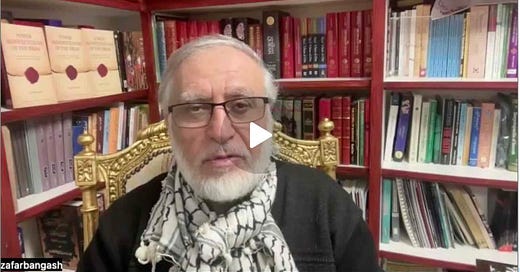Zafar Bangash of Crescent International, author of Power Manifestations of the Sirah, notes that Syria has become Zionist-occupied territory after Assad’s ouster, and worries that “the genocide of Palestinians may look like a garden tea party compared to what they will do in Syria.” So how should the Islamic movement respond? Citing the Prophet’sﷺ example after the Battle of Badr, he seconds Mohamed Ousman’s argument that sometimes the best defense is a good offense. Extract:
Kevin Barrett: Welcome to Truth Jihad Audio Visual. I'm Kevin Barrett doing a combination of prerecords and live broadcasts. This is a prerecord, and I am touching base with one of my main references, both in terms of what justice is all about in the Islamic religion, and also how that is reflected in today's world history and current events. Zafar Bangash is the author of Power Manifestations of the Sirah. He's written about leadership in islam and he has a new article out at his Substack, which I highly recommend, and that is called The Islamic Resistance and What Is to Be Done: The Islamic Movement Perspective. And he points out that maybe the Islamic movement needs to get a little bit more on the offensive, a little bit more unpredictable. Maybe we're being a little bit too nice, a little bit too reasonable. Maybe we need to step outside the expectations of the opposition and find better ways to respond to these ridiculous attacks that are coming at us from every direction. So let's get into it. Welcome, Zafar. As-salamu alaykum. Good to have you.
Waalaikumsalam, Kevin. It's wonderful to be with you, and I look forward to this discussion.
Likewise. I appreciate the great work you do at Crescent International, where I also write. And I thought this latest piece was really interesting, though not very specific about... precisely what the Islamic movement needs to do to push back against...well, the main problem right now, obviously, is the Zionist genocide and the Greater Israel Project. But that's tied into the larger Western imperial movement to take over the planet. Tell us a little bit about the article and your take on these current events.
Bismillahirrahmanirrahim. First of all, we need to understand that as far as the Islamic movement is concerned, it must derive its methodology from the sirah of the Prophet. He is the one who demonstrated to us as Muslims how the message of the Quran is to be implemented in our lives, what we are supposed to do, how we are supposed to do it. And in the article that you made reference to by Muhammad Usman, one of our writers, and of course that's our approach as well, he points out to a particular episode in the Prophet's life. That was the Battle of Uhud. Muslims probably would be familiar with what took place, but for your other viewers or listeners, let me say that that battle took place just outside Medina in the third year of the Prophet's migration from Mecca to Medina. Now, initially, the Muslims, only 700 of them—they had set out with 1000, but 300 broke away from them. Those were, of course, the hypocrites who were not sincere to the Muslim cause. They broke away. And there was a 3000-strong Meccan army facing the Muslims. And they came face to face in a place called Ohud.
In Medina, there is a mountain, the Mount of Ohud. And there was a slope where the Prophet appointed or installed archers on that hill and told them that you are not to abandon your positions regardless of what happens on the battlefield, because those archers were supposed to protect Muslims from the rear so that the Meccan cavalry could not come from behind the Muslims to attack them from the rear as they were facing the Meccan army.
Initially the Muslims were successful. Only 700 of them were facing a 3000-strong army. But because Muslims were very committed, they were able to overpower and drive off the mushriks, the Meccan army. And as the Meccan army started to flee, Muslims started to collect war booty. And these 50 archers that were stationed on the hill, saw that the Mushriks were running away and Muslims were gathering war booties.
So 40 of the 50 archers that were stationed there abandoned their positions. The others pleaded with them not to leave their position because the Prophet had instructed them not to do so. And yet they just abandoned their positions, thereby exposing the Muslims to an attack from behind by the Meccan cavalry.
And unfortunately, a total victory was turned into a major defeat. More than 70 Muslims were martyred in that battle. It was a major setback. The Prophet himself was badly wounded. And then the Muslims took refuge by climbing up a hill, and the Makkan army under the command of Abu Sufyan left.
Now, of course, Muslims suffered grievous losses. They also were wounded, and yet the Prophet did not take a defensive position. He realized that the Meccan army, when they left the battlefield, would realize that they did not finish the job, so they might come back after the Muslims. So the Prophet ﷺ told his followers that, regardless of our condition, we have to go after the Meccans so that they know that we are not defeated, we are not demoralized.
And so here is a situation whereby Muslims were badly wounded, they had lost a number of very important figures, and yet they still went after the Meccan army. And then, of course, the Meccan army, whose chief at that time was Abu Sufyan, learned about it, that the Muslims were coming after them. He realized that the Muslims were not defeated. So he decided it's best not to confront the Muslims and not to engage in a fight, because obviously Muslims are determined to avenge their defeat.
So this has a very important lesson even in today's situation, in that naturally Muslims have suffered a setback, particularly in Syria. But the prophet's example shows us that even in that setback, instead of retreating, instead of withdrawing from the struggle, that we need to go on the front foot, on the offensive, and confront our enemies.
And of course, what this means is that The Islamic Republic of Iran has to go on the front foot. It has lost an important place in Syria. Not that Bashar al-Assad's government was involved in the resistance, but at least Syria was providing a transit facility for help and weapons to be sent to Hezbollah in Lebanon.
So now I think Iran has to take the initiative. The Ansarullah in Yemen are doing a wonderful job. The Hasht al-Shaabi, the Iraqi resistance forces, are doing a good job. The Palestinians have not abandoned their struggle despite the massive, massive suffering that the Zionists have inflicted upon them, including an absolute genocide of the Palestinian people.
But now is not the time to sit back and sort of relax. Now is the time actually to go after the enemy. And the Quran tells us that in war, even if Muslims are affected and have suffered setbacks, the enemy also has suffered setbacks. And I believe quite honestly and sincerely that the Zionists also have suffered a lot of setbacks, a lot of damage, and Muslims have to go on the front foot. We can discuss as to exactly what that might entail, but I think this is the position that we take, and this is what the thrust of Mohamed Ousman's article on Substack https://crescentinternational.substack.com/p/the-islamic-resistance-and-what-is was about.
Right. Yes, it's an excellent article. I'm glad that you shared it. And so do you think that part of the problem with the Syrian collapse, among the many factors that led to it, are that Syria was sort of the weak link in the axis of resistance in Syria? Its organizing ideology wasn't particularly Islamic. The struggle between the Islamic ideologies and the left-wing secularists and nationalists with Arab nationalist ideologies has been going on for decades in this region. And Syria with its Baath Party took an Arab nationalist ideological orientation, which did have its good points in terms of being open to working with Islamic forces for justice. And we certainly need more of that willingness to work for justice with other people that we don't fully agree with.
But it seems that the Syrian military was really not there. It melted away there at the end in a kind of a shocking way. I don't think committed Muslims would do that.
Absolutely. And that's precisely what the challenge was, that the Syrian government did not follow the Islamic ideology. As you mentioned, it followed a secular ideology of Baathism. Secondly, Bashar al-Assad unfortunately fell for the promises that the Arabian rulers made to him. And those were that "instead of fighting, what you should do is you should let us build Syria for you. We will give you money and you should not put up a fight." Qatar, the UAE, and Saudi Arabia were involved.
Secondly, because of the sanctions that the US had imposed upon Syria, obviously Syria was not able to get help from anywhere except from the Islamic Republic of Iran and from Russia. And Syria's productive areas, its oil fields, its rivers, and its agricultural lands were controlled by the Americans, and they still control them illegally in northeast Syria.
And so the Syrian government was not even getting any revenues from its own resources. Now, the conspiracy against Syria had started as far back as 2005 when the Syrian army was ordered to leave Lebanon after the assassination of Rafiq Hariri, who was the president of Lebanon.
A false flag assassination, I believe.
Exactly. Absolutely a false flag. And it was blamed on the Syrian army. The Syrian army had nothing to do with it. In fact, there is strong indication that the Zionists were involved in that. And of course, they achieved their objective of getting the Syrian army evicted from Lebanon.
But in particular, since when these various sort of uprisings started in the West Asian region that is otherwise called the Middle East, it's interesting to note that among the regimes that fell or the rulers that fell, none of the monarchies, none of the kings fell. It started in Tunisia with Zainul Abidin bin Ali. Then it came to Egypt, Husni Mubarak. Then it went to Libya where Muammar Gaddafi was overthrown. He was lynched publicly. The president of Yemen, Ali Abdullah Saleh, was overthrown.
The uprising in Syria started in March of 2011. But because of the help that Iran, Hezbollah, and Russia provided, the Syrian government was able to withstand that.
But at the same time, there were literally tens of thousands of mercenaries that were rushed into Syria to fight against the Syrian army. With the help of Syria's friends, they held that front. But during the last days before the Syrian government was overthrown, both Iran and Russia had offered to Syria that they are willing to help with their own forces.
But unfortunately, Bashar al-Assad basically, as I said, fell for the promises of the Arabian monarchs. He felt that "perhaps these Arabian monarchs would be able to help me rebuild my country." NATO also misled him by telling him that "if you align with us and do not get more deeply involved with Iran and Russia, then we will remove the sanctions and that you will be able to rebuild your country."
And of course, you know, as far as the Syrian army was concerned, it was badly demoralized. They were not getting paid much. In fact, maybe five to seven dollars a month. The Syrian generals were all bribed by these Arab rulers as well as by Turkey. The money was coming from the CIA and of course the Arab regimes.So in other words, the Syrian army really had no motivation to fight because they had been at war for years. It was a conscript army, with lack of motivation and very, very poor conditions. Their equipment was all rusted. They didn't even have enough shells for their tanks, et cetera. So in that sense, basically, Syria was set up for a fall.
And the choices that Bashar al-Assad made were the kinds of choices that really brought down his regime. I do not hold any brief for Bashar al-Assad, but unfortunately, what has happened is that the people that have taken over are publicly declaring that "we don't want to have any conflict with Israel. We want to live in peace with Israel, even though Israel has occupied large chunks of Syrian territory in the south and there is every likelihood that Israeli forces will not withdraw from Syria."
In the north, Turkey will take Aleppo province because that was the original province from where the Ottoman Empire started. And then you have the most productive area of Syria in the northeast where the Kurds are located. And unfortunately, the Kurds throughout history have played a very, very devious role in terms of aligning themselves with the Zionists and the imperialists. They are used by these external forces and they're not going to benefit the Kurdish people. And yet they are foolish enough to fall for this and allow themselves to be manipulated by these external forces.
So for all practical purposes, unfortunately today, Syria as a country has disappeared. It's the first time in history that Syria as a country has disappeared, although it is a very, very long history. Even before Islam, Syria had a very noble existence.
But let's see how it evolves. I personally think that in the not too distant future the Syrian people themselves will not tolerate the kinds of thugs that have been imposed in power in Syria and they will not tolerate Zionist occupation of their country.
But what has happened is a major setback not only for the resistance front but also for the Syrian people. They would pay a very heavy price for liberating their country from the clutches of the Zionists and the imperialists.
But to come back to the original point that as far as the resistance front is concerned, they cannot play it on the back foot. They have to come forward. They have to take on the initiative. I personally feel at this time that I think as far as the Islamic Republic of Iran is concerned, that it should now abandon its policy of not acquiring nuclear weapons. I think Iran should proceed with acquiring nuclear weapons, not to threaten anybody, but to use it as a deterrent against Zionist blackmail and American blackmail—to make it clear to them that "if you attack us, if you target our nuclear facilities, then we are going to target your nuclear facilities, your chemical weapons facilities, and it's not going to be smooth sailing for you either."
And I think the Zionists have a lot more to lose because they live in such compact area. If the Damona nuclear reactor is attacked by 100 or so missiles, if Haifa is targeted where Israel's chemical weapons factories are, I think that will basically wipe out the total population of Haifa with poisonous gases, et cetera.
So I think that the Islamic Republic should now go on the front foot. Declare it, that they're going to abandon their policy of not acquiring nuclear weapons and tell everybody that if you attack us, we're going to go after you. And that's the only way that they will be able to achieve the objectives that they have set out to achieve…
(Read the full transcript at my Substack by clicking the “transcript” button above the video image on the right.)













Share this post